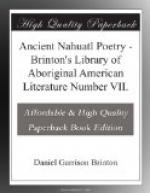1. huetzcani; one who laughs, a jester, perhaps the designation of one who sang cheerful songs.
chalchiuhatlaquiquizcopa; a. word of difficult analysis. I suspect an omission of an l, and that the compound includes tlaquilqui, one who fastens and puts together, a mason, etc.
5. The sense is that the warriors of Montezuma when on the field of battle, shine in their deeds like beautiful flowers in a field, and win lasting fame by their exploits.
mopopoyauhtoc. The grammarian Olmos explains the reflexive verb mopopoyauhtiuh to signify “he leaves an honored memory of his exploits.” See Simeon, Dictionaire de la Langue Nahuatl, sub voce.
7. Huexotzinco atzalan; “Huexotzinco amid the waters.” This expression, repeated in verse 8, appears inappropriate to the town of Huexotzinco, which lies inland. In fact, the description in verse 7 applies to Tenochtitlan rather than the singer’s own town. But the text does not admit this translation. Perhaps we should read “Huexotzinco and Atzalan,” as there are yet two villages of that name in the state of Puebla (which embraced part of ancient Huexotzinco).
10. petiatolini, I have derived from petlatl, suspecting an error in transcription. The reference is to the rushes in the mat on which the singer stood.
NOTES FOR SONG XXII.
The ordinary sad burden of the Nahuatl poets is repeated with emphasis in this plaint. It is a variation of the Epicurean advice, “Eat, drink, and be merry, for to-morrow we die.” Both the sentiment and the reference to Mictlan in verse 7, point it out as a production uninfluenced by Christian teaching.
7. The word ahuicaloyan, place of sweetness, would seem to be identical with ohuicaloyan, place of difficulty, in v. 8; I have regarded the latter as an error of transcription.
NOTES FOR SONG XXIII.
Although No. V. is probably one of the lost songs of Nezahualcoyotl, the present is the only one of the collection which is definitely attributed to him. The language is very archaic, and in the sentiment there is every mark of antiquity.
The text is apparently a dialogue, which was chanted as strophe and antistrophe, the one singer speaking for the King, the other for the bard himself.
The word teotl is used for divinity, and it is doubtless this word for which the copyists of some of the other songs have substituted the Spanish Dios, thus conveying an impression that the chants themselves were of late date.
The last verse, however, seems to be by one who lives after the time of the great poet-prince, and is calling him to memory.
NOTES FOR SONG XXIV.
It will be seen that there is a wearisome sameness in the theme of most of the short poems. Probably the bards followed conventional models, and feared for the popularity of their products, did they seek originality. Here again are the same delight in flowers and songs, and the same grief at the thought that all such joys are evanescent and that soon “death closes all.”




